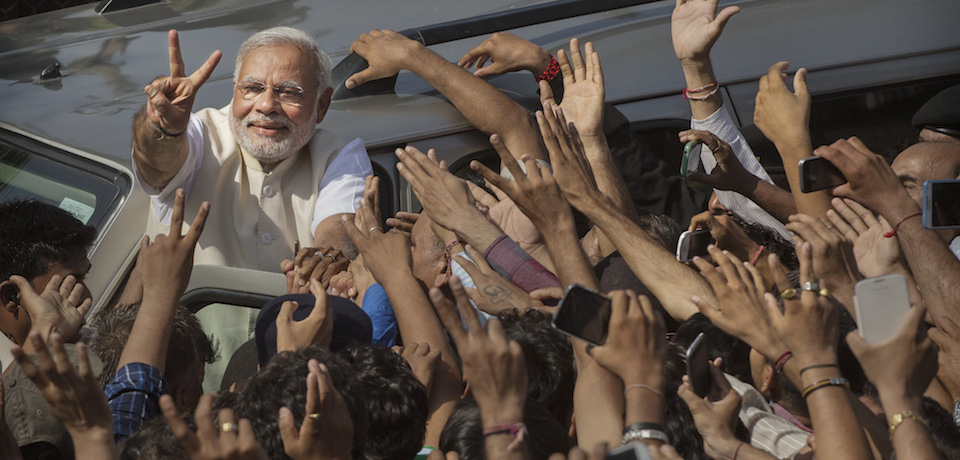India’s prime minister cuts a dashing figure in America, but back home, his two years in power have led to a dangerous — and unnecessary — coarsening of Indian democracy.
By Chandrahas Choudhury

In the two years since he was elected prime minister, Modi’s stock has fallen considerably at home. Some of this was inevitable. He invited unreasonably high expectations upon himself with a carefully calculated presidential-style campaign, especially since he then became the first prime minister to enjoy a clear majority in the Lok Sabha, India’s lower house of Parliament, in 30 years. But the sense of a missed opportunity also has much to do with how passive Modi has been with his stock of political capital — not just in an economic sense, but also in providing direction and self-definition to a diverse, rapidly liberalizing society and still-maturing democracy.
Critics of the prime minister say this, too, was inevitable. But it didn’t have to be this way. For a sense of the alternative path open to Modi in 2014, a short history of Hindu nationalism is in order. Often the movement is traced back to the 1980s, when it began for the first time to make inroads into the comfortable majorities enjoyed in the first three decades of Indian democracy by the Congress party, which gave India its liberal constitutional order in 1947.
To prevent himself from being gradually undermined by his own side, Modi should have invested the spoils of victory in a new long-term normal for his party — and given the party’s influence in national debate, for India itself.
Sadly, in Modi’s two years in charge Hindu nationalism has only reverted to type, as it were, thereby adding duplicity to its long catalog of bad faith. Consider the evidence.
In the first winter of the Modi era, the head of the RSS — a longtime friend of Modi’s by the name of Mohan Bhagwat — declared that no matter their actual religious identity, all Indians were “culturally Hindu,” emboldening other right-wing organizations to undertake a campaign of “ghar wapsi,” or the reconversion of Hindus converted to Islam or Christianity in centuries past. For months, the prime minister, who only occasionally gives interviews and then only to the foreign press, had nothing to say on the matter. The controversy festered endlessly in the mainstream media and on social media, disrupting many more important debates — including the important one about toilets — and setting the tone for the Modi era.
Instead, those supporting Kumar’s right to dissent, and pointing to a university as a space where no point of view was sacred, were accused by politicians and intellectuals of the new establishment of being “anti-national,” a word that has by degrees come to be applied to any criticism of the present government.
The prime minister has done nothing to stanch this coarsening of public discourse and breakdown of civility in India. When a number of prominent Indian writers, such as the great Hindi poet and intellectual Ashok Vajpeyi, returned their state awards to protest the creeping normalization of religious intolerance in India, the government, instead of engaging with their criticisms, called them “a manufactured protest.”
Modi rode to power on the back of a majority, but on his watch it has refashioned itself into a baying mob, resolutely opposed to religious and intellectual freedom. Allowed to take root, it could set India back many decades. (When released on bail, Kanhaiya Kumar’s remark, “We don’t want freedom from India, we want freedom in India,” struck a chord with many Indians who don’t otherwise share his politics.)
When Modi arrives in America, then, he will be given a hero’s welcome, as in the past, by hundreds of thousands of Indian-Americans. They will likely have no sense of the irony of their position: They are at liberty to be both Indian and American, while millions back home must win a “tested OK” sticker from the present regime before they are allowed to call themselves Indian.
All this explains why Modi will this week enjoy greatly his chance for a last tête-à-tête and photo-op with Obama. India’s disingenuous democrat knows full well that he won’t be able to squeeze the same symbolic meanings or endorsements out of a summit with, say, Donald Trump.
Read More at Foreign Policy








